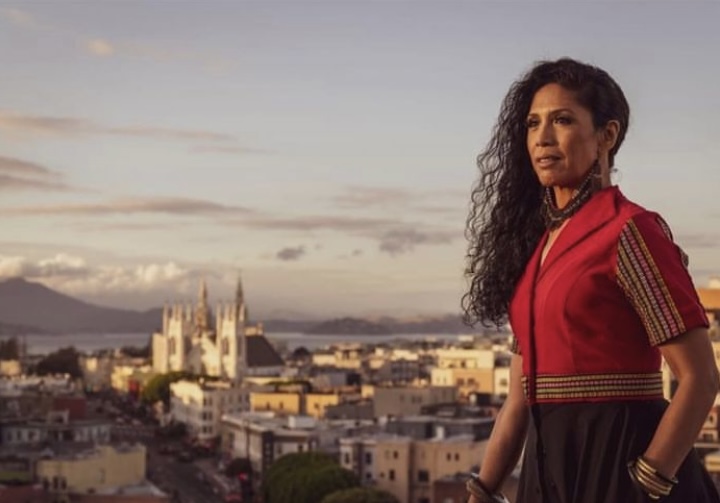Fil-Am weaves epic poetry in musical album ‘Sugilanon’

Indigenous Philippine percussionist, Jazz and R&B vocalist, composer and traditional arts educator Caroline Julia Cabading paints a rich tapestry of Filipino American history in her new album “Sugilanon.” CONTRIBUTED
SAN FRANCISCO – Indigenous Philippine percussionist, Jazz and R&B vocalist, composer and traditional arts educator Caroline Julia Cabading paints a rich tapestry of Filipino American history in her new album “Sugilanon.”
A distinguished and powerful cultural talent, Cabading will proudly debut the musical suite and celebrate the CD release at a San Francisco community event hosted by the Manilatown Heritage Foundation on March 22.
Titled after the Cebuano word for “story,” the anticipated album is inspired by the Philippine Kalinga Epic Poem di Ullalim. The original poem by the Kalinga people serves as a remembrance of their history, heroes and families.
Honoring the traditions taught by tribal Culture Bearers, Cabading transforms the epic poetry format into a musical performance representing the Filipino American experience in San Francisco. The album heralds stories of her family’s migration to America in 1904 leading up to the fall of the International Hotel in 1977. Song and spoken word alternate to relay a “hero’s journey” across four generations of family and community that illustrate the universal story of migration.

Caroline Cabading will proudly debut the musical suite and celebrate the CD release at a San Francisco community event hosted by the Manilatown Heritage Foundation on March 22. CONTRIBUTED
“Even as ‘Sugilanon’ tells the story of my family, it also tells the story of the larger Filipino American experience in San Francisco since the early 1900s,” explains Cabading. “It is an American story, with similarities to other cultures. When I would get on stage, family, friends and non-Filipinos would say, ‘That’s also my family’s immigration story.’”
As an original composition, “Sugilanon” presents a Filipino American jazz suite informed by ancestral Philippine musical motifs and instrumentation of the Maguindanao and Kalinga ethnolinguistic groups.
Cabading composes each number with the Kalinga rhythm of “7” compared to the western “8” count, while incorporating standards of jazz music. In the making of Sugilanon,
Cabading facilitated cross-cultural learning between the jazz and ancestral ensembles as a part of the creative process. The result is a captivating fusion of Filipino American jazz paying respect to its ancestral origins and contemporary influence.
“How Kalinga and Philippine kulintang music evolves in the world is the right only of the people of Kalinga and Mindanao to determine ,” says Cabading. “As a Filipino American composer then, where do I stand in regards to the incorporation of pre-colonial Philippine music into my own work?”
This started Cabading’s exploration of the Filipino American tribe as its own tribe – with its own rage, its own challenges, its own victories, its own history, its own culture and its own music.
“As an American my birthright is not traditional Philippine music; my birthright as an American is jazz, which was invented in America. In writing this suite, I am contributing to American jazz music and particularly to the genre of Filipino American Jazz. ”
A fourth-generation San Franciscan, Caroline Cabading has over 20 years of experience performing, touring, and teaching as a jazz artist and steward and student of Philippine ancestral music and dance. Cabading currently leads the jazz ensemble “The Autonomous Region” and the traditional Philippine ensemble, the “Manilatown Ancestral Ensemble.” Cabading has been commissioned by the San Francisco Arts Commission, California Arts Council, Zoo Labs and the Asian Pacific Island Cultural Center to compose original music contributing to the Filipino American jazz genre.
The commission and production of the March 22 CD release is made possible by the Gerbode Foundation Special Award in the Arts program as one of only eight musical commissions funded by the prestigious foundation last year.
Produced by their resident composer and executive director, “Sugilanon” is also the first of three community engagement projects launched by the Manilatown Heritage Foundation this year. The Manilatown Heritage Foundation incubates community-based creatives telling stories of the Filipino American community and offers community culture-bearer informed instructions on pre-colonial Philippine ancestral music.
“As American people, other than Native Americans, our lineage, our ancestors came here wanting a better life,” states Cabading. “All of our ancestors were heroic – we have to remember this when society makes immigrants of color seem like we are not true Americans. The first step for battling against any racial injustice is for us to not feel like we are victims. We come from heroes and warriors. Our family story is heroic.”
The Manilatown Heritage Foundation invites the public to the official album debut on Friday, March 22, 6 p.m. at the International Hotel on 868 Kearny Street in San Francisco, CA. Register for the event here.

